模块4 Unit 12 Culture Shock Lesson 3 Living Abroad 课件(24张PPT)
文档属性
| 名称 | 模块4 Unit 12 Culture Shock Lesson 3 Living Abroad 课件(24张PPT) | 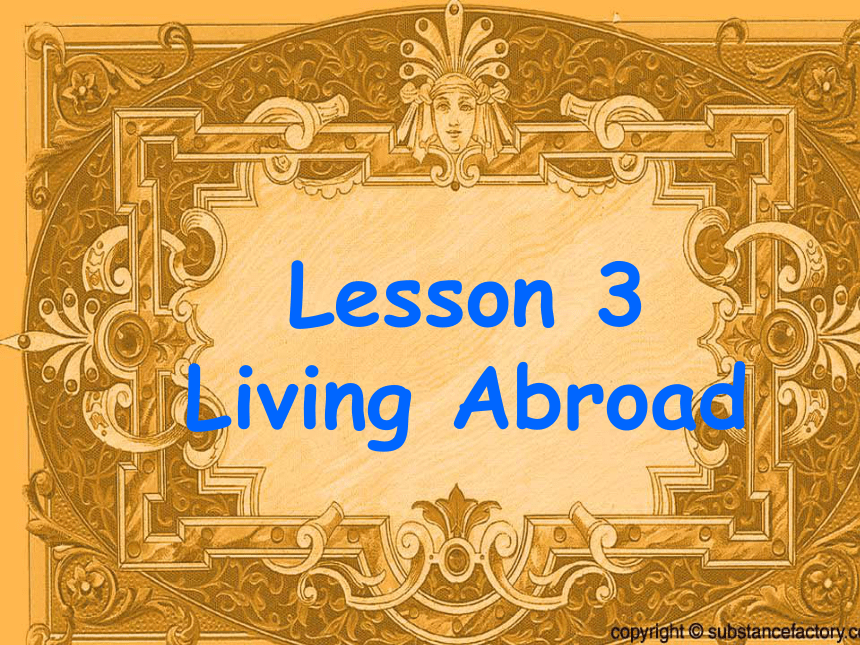 | |
| 格式 | zip | ||
| 文件大小 | 1.7MB | ||
| 资源类型 | 教案 | ||
| 版本资源 | 北师大版 | ||
| 科目 | 英语 | ||
| 更新时间 | 2019-12-08 17:14:40 | ||
图片预览

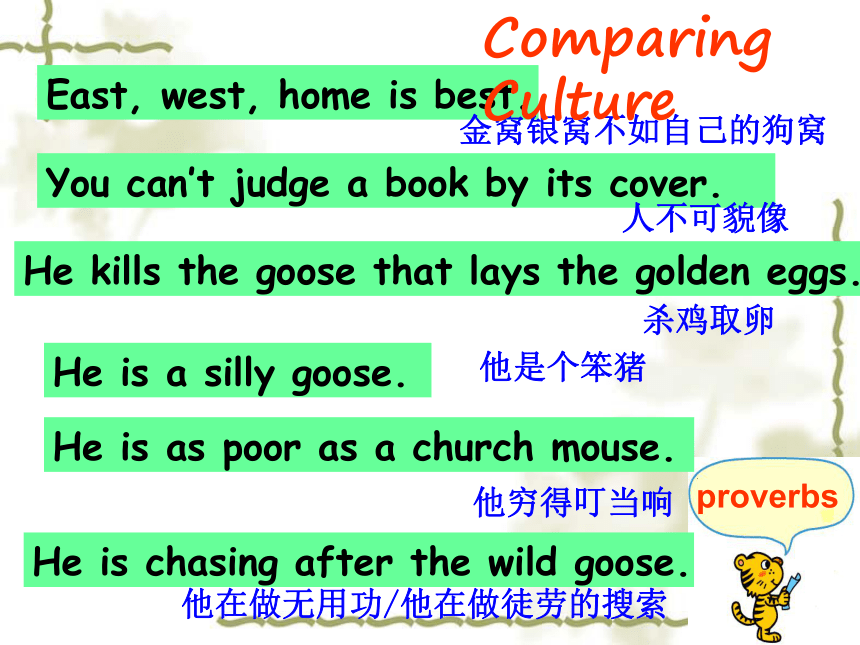
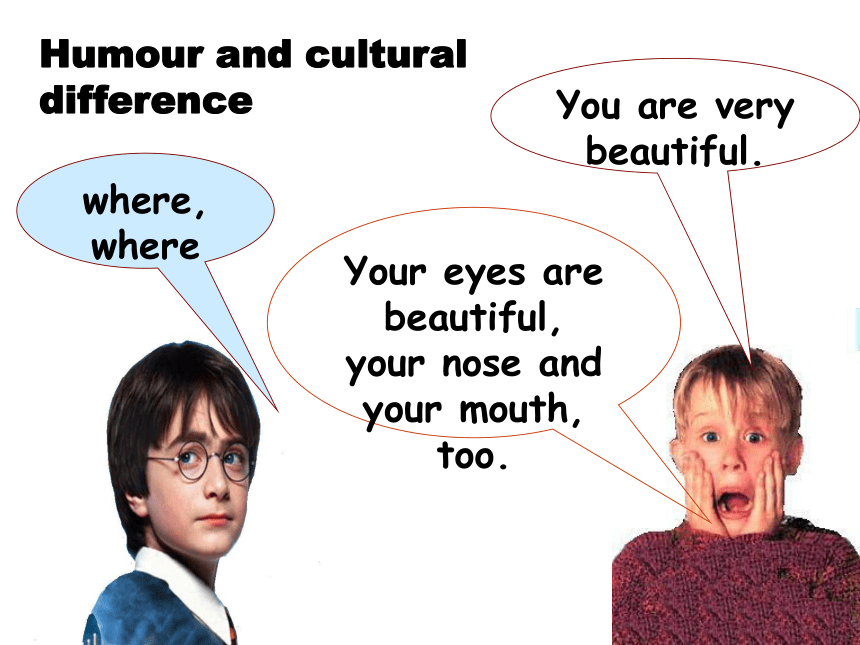
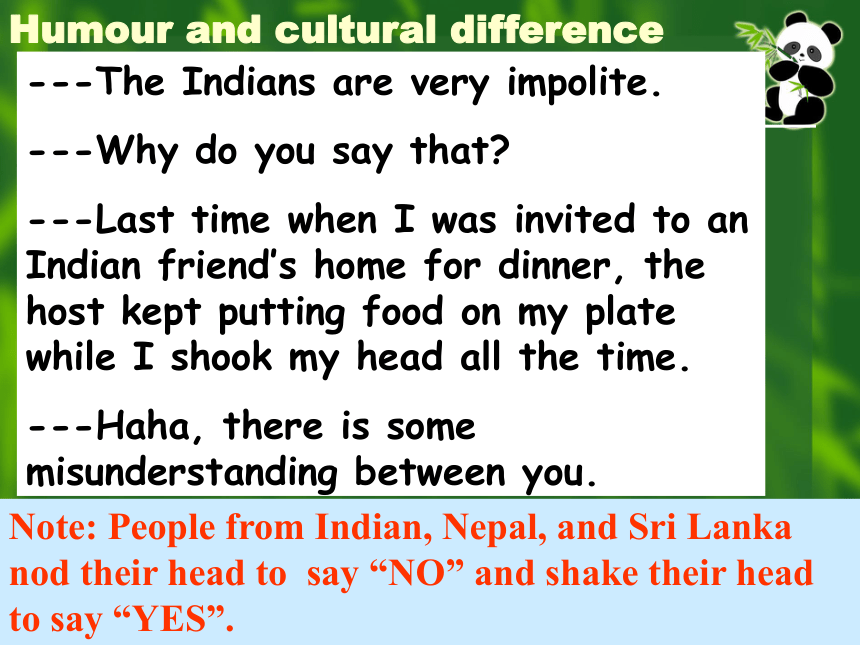



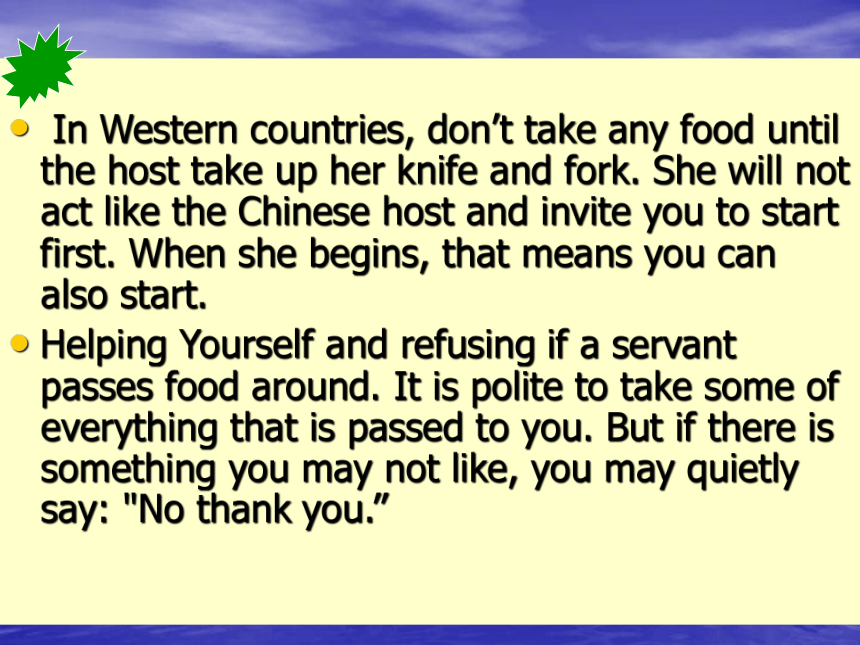
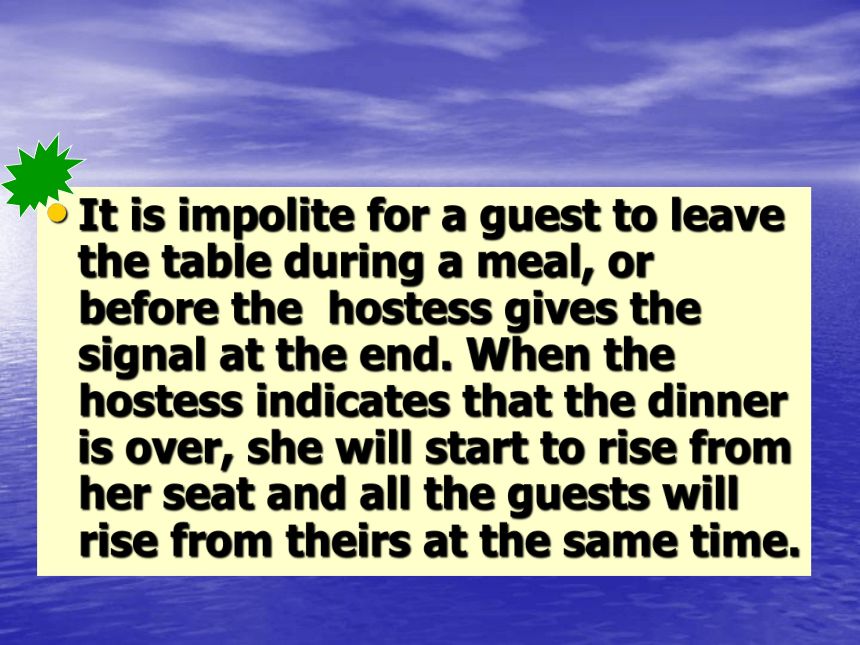
文档简介
课件24张PPT。Lesson 3 Living AbroadEast, west, home is best.He is as poor as a church mouse.He kills the goose that lays the golden eggs.He is a silly goose.He is chasing after the wild goose.You can’t judge a book by its cover.金窝银窝不如自己的狗窝人不可貌像杀鸡取卵他是个笨猪他在做无用功/他在做徒劳的搜索他穷得叮当响proverbsComparing CultureYou are very beautiful.
Humour and cultural differenceYour eyes are beautiful, your nose and your mouth, too.where, where
Humour and cultural difference---The Indians are very impolite.
---Why do you say that?
---Last time when I was invited to an Indian friend’s home for dinner, the host kept putting food on my plate while I shook my head all the time.
---Haha, there is some misunderstanding between you.Note: People from Indian, Nepal, and Sri Lanka nod their head to say “NO” and shake their head to say “YES”.The story of StoneTitanicComparing CultureWatch 2 videos and find out some differences between Chinese table manners and western ones In China perhaps one of the things that surprises a Western visitor most is that some of the Chinese hosts like to put food into the plates of their guests. In formal dinners, there are always
“public” chopsticks and spoons for this purpose, but some hosts may use their own chopsticks.
This is a sign of genuine friendship and politeness. It is always polite to eat the food.
If you do not eat it, just leave the food in the plate. People in China tend to over-order food, for they will find it embarrassing if all the food is consumed. When you have had enough, just say so, or you will always overeat!
In Western countries, don’t take any food until the host take up her knife and fork. She will not act like the Chinese host and invite you to start first. When she begins, that means you can also start.
Helping Yourself and refusing if a servant passes food around. It is polite to take some of everything that is passed to you. But if there is something you may not like, you may quietly say: "No thank you.”It is impolite for a guest to leave the table during a meal, or before the hostess gives the signal at the end. When the hostess indicates that the dinner is over, she will start to rise from her seat and all the guests will rise from theirs at the same time.Reading and True or False1. Jin Li adjusted well to the American way of life soon after arriving in the USA.2. We know Jin Li has at least one American friend.3. Wang Lei never went back to the restaurant in New York again.NITNIReading and True or False5. Tom couldn’t understand why his friend’s grandfather wanted to go with him to the bus station.6. Tina was a friend of the tourist guide.4. Martin stayed in China with a local family.NIFFFind the words in the texts which mean the following1. to give someone something and receive the same kind of thing from them2. a desire for food3. people who have guests4. a place where you can buy and eat a mealexchangeappetitehostrestaurantFind the words in the texts which mean the following6. friendly, welcoming, and generous to visitors7. extremely good, especially in an unexpected way8. feeling shy and uneasyhospitableappetiteembarrassed5. to be right for a particular personsuitWhat do you think is most interesting to you when you visit a city for the first time, its people, its food or its architecture?speakingLanguage Points1. familiar (adj.) 熟悉的 — strange
我很高兴再次见到你们这些熟悉的面孔。
I am happy to see your familiar faces again.
sb. be familiar with … 熟悉……
… be familiar to sb. …为某人所熟悉
这个男人熟悉游戏规则.
This man is familiar with the rules of the game.
The rules of the game is familiar to this man.Your name is familiar _____ me.
It is an area _____ which I had been familiar since childhood.
2. arrival (u.c.n.) 到达 — arrive (v.) + at / in
on one’s arrival = as soon as sb arrive
你一到达旅馆,就给我打个电话吧。
On your arrival at the hotel, give me a call.
3. have a difficult time / difficulty / trouble / problem (in) doing sth
Jeff找工作的时候有些吃力。
Jeff had a difficult time in finding a job.towith4. aspect (n.) 方面
我们应该看问题的各个方面。
We should look at every aspect of the problem.
5. splendid (adj.) = excellent
极好的主意、成就、文章、晚饭
a splendid idea, achievement, article, dinner
6. outgoing (adj.) = friendly and sociable
他拥有外向的个性。
He has an outgoing personality.7. embarrassing (adj.) 尴尬,难堪
你是想让我难堪吗?
Are you trying to embarrass me?
8. cautious (adj.) = careful —— caution (n.)
be cautious about / of …… 对…小心、谨慎
9. sound like 听起来像
听起来像是一个好主意.It sounds like a good idea.
Tina既漂亮又聪明.这听起来像不像是个完美的女朋友?
Tina is clever as well as beautiful. Does this sound like a perfect girlfriend?10. whisper (v.) = say sth in a low voice
whisper to sb 对某人耳语
他对她耳语,以避免被听见.
He whispered to her to avoid being heard.
whisper sth to sb 对某人悄悄说了…
我对我朋友悄悄说了一个秘密。
I whispered a secret to my friend.
11. custom (n.) 习俗,习惯
握手是外国的风俗.
Shaking hands is a custom of foreign countries.habit (个人)习惯
我有午休的习惯。
I have a habit of having a rest after lunch.
1) We need to develop the _____ of reading carefully.
2) The celebration of Spring Festival is a _____ for Chinese.
12. have a good appetite
13. speak —— spoke —— spoken
English is widely spoken.
I want to improve my spoken English.customhabit14. insist on + doing 坚持要做……
她坚持要邀请她所有朋友来参加party.
She insisted on inviting all her friends to the party.
insist (v.) + that
我父亲坚持认为我对他撒了谎.
My father insisted that I had lied to him.
我坚持要求他马上离开.
I insisted that he leave at once.陈述语气 “坚持认为”
(should) do “坚持要求”15. conduct (v.) ----- conductor (n.)
a. 指挥(乐队等) b. 进行 c. 表现 d. 带领 e. 导电
1.He should learn how to conduct a meeting.
2.Who is conducting the orchestra (管弦乐队) this evening?
3.He conducted the members of the audience to their seats.
4.Most plastics (塑料) don’t conduct heat or electricity.
5.Children conducted themselves well at the party.abcdeBye-bye !
Humour and cultural differenceYour eyes are beautiful, your nose and your mouth, too.where, where
Humour and cultural difference---The Indians are very impolite.
---Why do you say that?
---Last time when I was invited to an Indian friend’s home for dinner, the host kept putting food on my plate while I shook my head all the time.
---Haha, there is some misunderstanding between you.Note: People from Indian, Nepal, and Sri Lanka nod their head to say “NO” and shake their head to say “YES”.The story of StoneTitanicComparing CultureWatch 2 videos and find out some differences between Chinese table manners and western ones In China perhaps one of the things that surprises a Western visitor most is that some of the Chinese hosts like to put food into the plates of their guests. In formal dinners, there are always
“public” chopsticks and spoons for this purpose, but some hosts may use their own chopsticks.
This is a sign of genuine friendship and politeness. It is always polite to eat the food.
If you do not eat it, just leave the food in the plate. People in China tend to over-order food, for they will find it embarrassing if all the food is consumed. When you have had enough, just say so, or you will always overeat!
In Western countries, don’t take any food until the host take up her knife and fork. She will not act like the Chinese host and invite you to start first. When she begins, that means you can also start.
Helping Yourself and refusing if a servant passes food around. It is polite to take some of everything that is passed to you. But if there is something you may not like, you may quietly say: "No thank you.”It is impolite for a guest to leave the table during a meal, or before the hostess gives the signal at the end. When the hostess indicates that the dinner is over, she will start to rise from her seat and all the guests will rise from theirs at the same time.Reading and True or False1. Jin Li adjusted well to the American way of life soon after arriving in the USA.2. We know Jin Li has at least one American friend.3. Wang Lei never went back to the restaurant in New York again.NITNIReading and True or False5. Tom couldn’t understand why his friend’s grandfather wanted to go with him to the bus station.6. Tina was a friend of the tourist guide.4. Martin stayed in China with a local family.NIFFFind the words in the texts which mean the following1. to give someone something and receive the same kind of thing from them2. a desire for food3. people who have guests4. a place where you can buy and eat a mealexchangeappetitehostrestaurantFind the words in the texts which mean the following6. friendly, welcoming, and generous to visitors7. extremely good, especially in an unexpected way8. feeling shy and uneasyhospitableappetiteembarrassed5. to be right for a particular personsuitWhat do you think is most interesting to you when you visit a city for the first time, its people, its food or its architecture?speakingLanguage Points1. familiar (adj.) 熟悉的 — strange
我很高兴再次见到你们这些熟悉的面孔。
I am happy to see your familiar faces again.
sb. be familiar with … 熟悉……
… be familiar to sb. …为某人所熟悉
这个男人熟悉游戏规则.
This man is familiar with the rules of the game.
The rules of the game is familiar to this man.Your name is familiar _____ me.
It is an area _____ which I had been familiar since childhood.
2. arrival (u.c.n.) 到达 — arrive (v.) + at / in
on one’s arrival = as soon as sb arrive
你一到达旅馆,就给我打个电话吧。
On your arrival at the hotel, give me a call.
3. have a difficult time / difficulty / trouble / problem (in) doing sth
Jeff找工作的时候有些吃力。
Jeff had a difficult time in finding a job.towith4. aspect (n.) 方面
我们应该看问题的各个方面。
We should look at every aspect of the problem.
5. splendid (adj.) = excellent
极好的主意、成就、文章、晚饭
a splendid idea, achievement, article, dinner
6. outgoing (adj.) = friendly and sociable
他拥有外向的个性。
He has an outgoing personality.7. embarrassing (adj.) 尴尬,难堪
你是想让我难堪吗?
Are you trying to embarrass me?
8. cautious (adj.) = careful —— caution (n.)
be cautious about / of …… 对…小心、谨慎
9. sound like 听起来像
听起来像是一个好主意.It sounds like a good idea.
Tina既漂亮又聪明.这听起来像不像是个完美的女朋友?
Tina is clever as well as beautiful. Does this sound like a perfect girlfriend?10. whisper (v.) = say sth in a low voice
whisper to sb 对某人耳语
他对她耳语,以避免被听见.
He whispered to her to avoid being heard.
whisper sth to sb 对某人悄悄说了…
我对我朋友悄悄说了一个秘密。
I whispered a secret to my friend.
11. custom (n.) 习俗,习惯
握手是外国的风俗.
Shaking hands is a custom of foreign countries.habit (个人)习惯
我有午休的习惯。
I have a habit of having a rest after lunch.
1) We need to develop the _____ of reading carefully.
2) The celebration of Spring Festival is a _____ for Chinese.
12. have a good appetite
13. speak —— spoke —— spoken
English is widely spoken.
I want to improve my spoken English.customhabit14. insist on + doing 坚持要做……
她坚持要邀请她所有朋友来参加party.
She insisted on inviting all her friends to the party.
insist (v.) + that
我父亲坚持认为我对他撒了谎.
My father insisted that I had lied to him.
我坚持要求他马上离开.
I insisted that he leave at once.陈述语气 “坚持认为”
(should) do “坚持要求”15. conduct (v.) ----- conductor (n.)
a. 指挥(乐队等) b. 进行 c. 表现 d. 带领 e. 导电
1.He should learn how to conduct a meeting.
2.Who is conducting the orchestra (管弦乐队) this evening?
3.He conducted the members of the audience to their seats.
4.Most plastics (塑料) don’t conduct heat or electricity.
5.Children conducted themselves well at the party.abcdeBye-bye !
